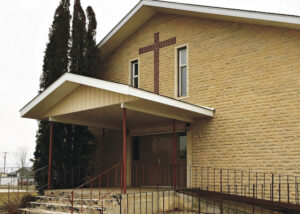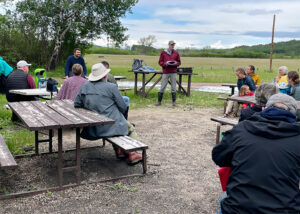Someone once said, “There’s no such thing as part-time pastors, only part-time salaries.” If this is true, a lot of congregations within Mennonite Church Canada are getting good value for their money.
Bi-vocational ministry has become increasingly commonplace as churches decrease in size and can no longer afford full-time pastors. Even large congregations who employ pastoral teams frequently have one or two part-time ministers on their payroll. For better or worse, part-time ministry is here to stay and may become even more prevalent in the future.
For many bi-vocational pastors, there’s more than a ring of truth to this article’s opening statement. Hired to work 20 or fewer hours a week, they feel they are pastors 24/7.
Rob Wiebe ministers at Church of the Way in Granisle, B.C., and works at a sawmill in Burns Lake. “Even when I’m sitting in that forklift at work I can’t really take that pastor hat off,” he says. “How do you determine when you’re not ministering?”
Carrie Martens of Stirling Avenue Mennonite in Kitchener, Ont., agrees. “I am a pastor all the time,” she says. “Since it’s a vocation and a calling, it’s not something that is easily turned off at the end of a day.”
Terry Goertzen of Jubilee Mennonite in Winnipeg adds, “Even when I’m doing my other job, I’m still a pastor. This is my life orientation.”
Managing their time
Not all pastors share this viewpoint. They also may see ministry as their calling, but they keep track of their hours. Crisis visitations or special events may require them to work extra hours some weeks, but those hours are banked for a less busy time.
Ray Friesen and his wife Sylvia share a half-time position at Emmaus Mennonite Church in Wymark, Sask. “The church’s expectations are that we be careful about the hours worked,” Ray says. “We have to be deliberate about it.”
Wildwood Mennonite in Saskatoon has been intentional about keeping its expectations in line with Krista Loewen’s part-time associate pastor contract. “I’ve heard stories where youth pastors are given part-time salaries with huge expectations,” Loewen says, “but this is not my experience.”
Erika Enns-Rodine, who is on the pastoral team at First Mennonite in Winnipeg, says, “The congregation and lead minister do not have demanding expectations for the staff, and I think it helps that there are four of us ministers to share the load.”
How pastors supplement their income
Bi-vocational pastors supplement their income in many different ways. Some, like Gerald Neufeld, are employed in other church-related work. He pastors Mennonite Japanese Christian Fellowship in Surrey, B.C., and serves as music coordinator for Emmanuel Mennonite in Abbotsford. Others work for para-church organizations: teaching on a contract basis at a Bible college, doing administrative work at an area church office, editing Sunday school curricula, writing for a church periodical. Still others find they can earn extra income through pulpit supply for other congregations.
Many pastors’ secondary employment is totally unrelated to the church. Some work in construction or maintenance jobs. Others work the checkout at their local grocery store or as servers in restaurants. Some pastors are business owners or farmers.
Understandably, secondary jobs impact ministry. Part-time pastors may have to opt out of some church activities because of their other jobs.
Sara Erb of Breslau (Ont.) Mennonite knows this isn’t easy for congregations to understand. “People are trying to respect the fact that I have to say no to some things,” she says. “They just don’t want me to say no to their things.” Having secondary jobs may also mean part-time pastors have little time off. Erb says, “Time off from any one position means I’m working somewhere else.”
Goertzen agrees. “I’m never off,” he says. “I’m forced to say no to opportunities that I would like to say yes to, on both sides.”
Keeping two balls in the air at one time
Juggling two part-time jobs can also be exhausting.
“Two part-time jobs don’t equal one full-time,” says Martens. “They both overflow and it’s hard not to be ministering seven days a week.”
Friesen agrees. “Trying to do two jobs half-time takes more energy than doing one job full-time,” he says. “When I was primarily a pastor, that was easy. Bi-vocational ministry is far more difficult.”
Greg Thiessen of First United Mennonite in Vancouver echoes this sentiment: “Two half-time jobs is always going to be more than a full-time job.”
Lois Siemens balances ministry at Superb Mennonite near Kerrobert, Sask., with a part-time job, pulpit supply and a personal business. She confesses, “I went through a year of burnout because I felt so fragmented.”
Financial insecurity can also be an issue. Like Siemens, pastors may live in rural areas where there are few jobs available. Or, like Erb, they may find their training has made them so specialized that they’re not qualified for many other jobs. “There’s not a whole lot of wiggle-room to try new things or use your gifts in other ways,” Erb says. Add to this the reality that many part-time pastors don’t earn enough at either job to qualify for health benefits.
The advantages of bi-vocational ministry
While most pastors admit bi-vocational ministry is challenging, many feel the advantages outweigh the disadvantages.
Gerry Binnema of United Mennonite in Black Creek, B.C., operates an aviation safety business. He says bi-vocational ministry offers “two places where you can feel competent.”
Harry Harder pastors Pleasant Point Mennonite near Clavet, Sask., and raises sheep. He feels part-time ministry is ideal because it affords him numerous identities.
Part-time ministry can also be flexible. Bruce Jantzen’s responsibilities at Laird (Sask.) Mennonite allow him to participate in his family’s farming operation. He says, “I like being part-time because I feel more relaxed in time scheduling and less constricted regarding my ability to farm on the side.”
Urban pastors appreciate the flexibility of their part-time positions, too. Andrea De Avila of Sargent Avenue Mennonite in Winnipeg says, “The advantage is that I don’t have to be in the office nearly as often. During the week, if I really plan ahead, I can be gone for several days in a row and still [tend to] my pastoral duties.”
One distinct advantage for some part-time pastors is the reality check that comes with working in the secular world.
Harold Schilk says that when he was a full-time pastor, his congregants suggested he really didn’t know what the real world or real work were all about. Now, as part-time pastor at Springridge Mennonite in Pincher Creek, Alta., he says, “I don’t get that comment anymore. It’s important to keep contact with the world. It informs my ministry and my sermon writing.”
Allan Friesen of Eigenheim Mennonite, near Rosthern, Sask., works as an interpreter at a provincial historic park and he also farms. He says being in the workforce helps him relate to congregants with jobs, while farming helps him better understand other farmers in his rural congregation. “Full-time ministry can leave you out of touch with what congregants are dealing with,” he says.
Ray Friesen agrees: “I think a pastor’s world can get too small. Your whole world is the church, and you run the risk of not being worldly enough. Being in the world is really good. It helps me to think about my Christian faith.”
Some pastors say their seminary education didn’t prepare them for bi-vocational ministry.
Goertzen believes this is because “seminary engages with ideas, not real human beings.” And while it was good to study those ideas, Goertzen wishes his education had included a practical component as well.
Although Schilk feels called to his current ministry, he wonders, “Would I have spent as much time and energy getting my M.Div. if I’d known I’d be working part-time?”
New pastoral paradigms
Ray Friesen thinks bi-vocational ministry “can work very well as long as pastor and congregation want to make it work well,” but adds, “There will have to be new pastoral paradigms.”
Martens agrees. “I think churches are going to need to take a step back and re-imagine their needs [or perceived needs] in relation to their responsibility to hire pastors in a sustainable manner,” she says. “The desire to have specialists in our churches, while at the same time having reduced funds, is leading churches to half-, quarter- and even smaller positions.”
She offers a model that may work for larger congregations: “I wonder what it would be like if churches hired fewer people for larger more general positions, and then we all found ways to share our specialties across several churches or even more broadly in the area church.”
What might new pastoral paradigms look like in rural areas where small congregations are more concerned about having someone in the pulpit on Sunday morning than they are about specializations? For some churches, sharing a minister may be an option. For others, providing affordable housing and extended health coverage may help supplement a part-time income.
In both urban and rural settings, congregational support will need to be part of any new paradigm. Churches will need to have realistic expectations of part-time pastors. Secondary jobs will necessarily take time away from ministry. Supporting a part-time pastor may mean congregants picking up the slack, doing tasks their pastor is unable to do. Supporting a part-time pastor will also mean being gracious and forgiving when tasks are left undone or aren’t done to everyone’s satisfaction.
Pastors will continue to accept part-time positions because they feel called by God and the church. They will continue to give more time and energy to their work than the hours for which they are paid. Congregations will do well to consider the realities of bi-vocational ministry, recognizing that its challenges and blessings are theirs as well.
See also: “A pastor’s holy moments.”
For discussion
1. Has your church ever employed part-time ministry staff? Do you think having a part-time pastor is more of a blessing or more of a challenge? Is it common for pastors to struggle with too many expectations for the work hours they are paid? Does it happen more with part-time pastors?
2. Donna Schulz writes, “Bi-vocational ministry has become increasingly commonplace as churches decrease in size and can no longer afford full-time pastors.” Is this true in your region? When does it make sense for smaller congregations to share a pastor? Under what situations is it better to hire a bi-vocational pastor?
3. Schulz comments that if a congregation moves from having a full-time to a part-time pastor, some tasks might be left undone. What might these tasks be? Do congregations expect less professional training for part-time pastors?
4. Does Mennonite Church Canada provide good guidelines for congregations regarding remuneration for pastors? What are some other ways in which congregations can support their pastors?
—By Barb Draper











Leave a Reply
You must be logged in to post a comment.